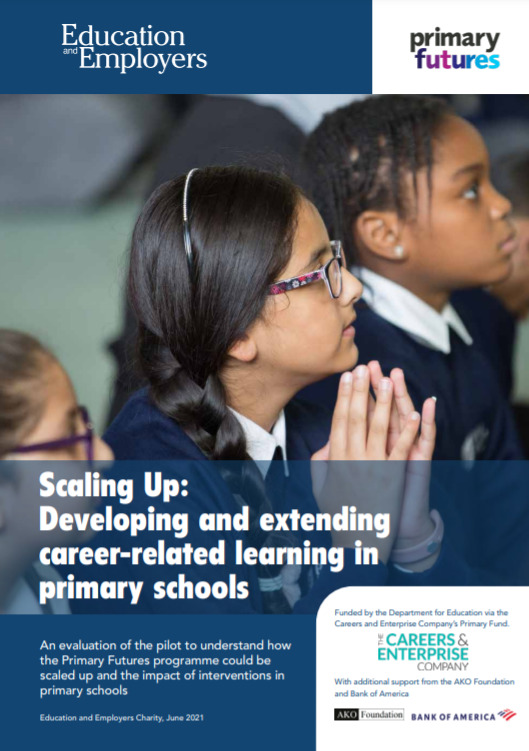Today we publicly launch our report – ‘Scaling up: Developing and extending career-related learning in primary schools’. This report evaluates one of the projects we have worked on over the past 18 months to scale up our Primary Futures programme nationally. We are thrilled to share the findings with you!

Across England, 370 primary schools took part to explore the impact of meeting relatable role models at primary. We received data from close to 10,000 pupils, and this has formulated the largest impact study on career-related learning in primary globally to date. We are delighted to announce that the findings have been enormously encouraging, showing benefits for children’s attitudes to learning, their ambitions for the future, and challenging stereotypes – and the benefits are even more apparent for disadvantaged pupils.
We ran a teacher training webinar in the autumn term to explore the research – watch now.
A huge thank you to all schools, teachers and children who took part in the study, and to our whole Primary Futures community for the work you do to inspire your young people. We hope you find this report an interesting read, and have a fantastic summer break.
This project was funded by the Department for Education via the Careers and Enterprise Primary Fund.
Read the full Scaling Up report
Key findings from ‘Scaling Up’
Here are some of the key findings that may be of interest to share with your staff, SLT, governors or networks:
- Primary Futures works wherever you are – Findings were consistently positive across a wide geography of 370 schools and 114 local authorities.
- Virtual activities are as impactful as face-to-face activities – Less data (84 pupils) is available on the impact of pre-recorded sessions to make statistically significant conclusions, however the indications are very positive, and schools are innovatively taking advantage of the opportunities offered by virtual.
- Both teachers and children’s feedback evidences positive outcomes – For children who were tracked providing pre/post feedback, findings showed the strongest shifts in attitude over time were in children:
- knowing about a greater range of jobs (10.8%pts net positive shift)
- thinking they can do anything when they grow up (9.1%pts)
- considering that science and engineering are for people like them (7.4%pts).
- Disadvantaged children benefit the same as, and often more than, their counterparts – 82% of almost 10,000 children said they now understand that core subjects can be useful in many jobs after a Primary Futures activity, with this being higher in schools with high FSM.
- More is more – Children who heard about more jobs or took part in more Primary Futures activities were more likely to report positive impact, making a strong case for schools to embed career-related learning.
- Relatable role models and enjoyment are key to impact – When children felt they could relate to the volunteers, they consistently reported greater enjoyment and influence from the Primary Futures activity.
Read case studies from the report: In rural Cornwall, young polar explorers connected with an Antarctic explorer based in Edinburgh, Corby infants toured an airport hanger via screen, learners in Bradford linked with legal minds in London on their civil rights topic, and children in Doncaster met a suite of accessible role models with strong local links whilst at home during lockdown.
Again, we are so grateful to all 370 schools who were involved in the project – see the schools here!
